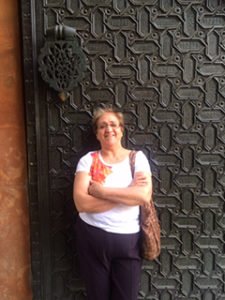Faliha Kadhim Al-Radhi
SPAWNING FROM THE GOLDEN ERA OF IRAQI ART AND CULTURE, FALIHA KADHIM’S WORK EMBODIES THE NOTIONS OF WAR, PERSECUTION AND OPPOSITION. STEMMING FROM HER OWN HISTORY AND LIFE IN IRAQ, FALIHA’S INITIAL CONCERNS SPRANG FROM THE SOCIAL INEQUALITIES PRESENT BETWEEN MEN AND WOMEN. ALTHOUGH HER PERSONAL ENVIRONMENT AT HOME WAS LOVING AND EQUAL, THE CONCERN REGARDING THE INEQUALITIES FACED BY WOMEN BOTH SOCIAL AND ECONOMIC CREATED A DEEP SENSITIVITY AND HIGHLIGHTED OTHER ISSUES OF CRUELTY AND SUFFERING.
In the turmoil of the political upheavals that ravaged her world as a young woman, witnessing killings and vindictive massacres left fear and anxiety that inevitably found expression in her paintings. Faliha’s work is nothing more than a manifestation of desperate moments and incidents that haunted her as an artist and a free spirit.
Looking at her work, one can definitely sense a form of shock, and torment. The suffering cannot be easily distinguished from the emaciated figures, depressed expressions and sombre backgrounds. This inevitably provokes the audience to contemplate about the global disasters. When viewing her work, it is apparent that brush strokes create a linear display of violence and cruelty that Iraq faced during the last century. But as there always is, at the edge of pain there is the window of light and hope.
Speaking about her work, Faliha says that:
“Before I begin to paint an extraordinary idea is born. The concept matures with motivation and takes root in my mind with a sudden emotional urge to bring it into reality. I have tried to express, with resolve and determination, the events that my country was experiencing, however the lack of freedom became my one and only barrier. Fear engulfed me in every way.
My foremost concern was the safety of my family. This concern restrained me from expressing my ideas and work for many years. I have silenced my thoughts and yearnings to portray the reality of my country’s misery and only allowed my eyes to become the single vivid documentation of the on-going atrocities around me.
I firmly believe that art is a universal language where emotions are evoked and perceptions sensed. By exposing horrendous atrocities, there is a mild hope that my work may raise awareness.
My dedication is to the people of sand, oil and the origin of civilisation. Iraq is the home of ingenuous scholars, glorious empires and incessant pain.
I would like to thank people throughout my life that have given me the opportunity to exhibit my work and cannot help but think of my mother who died and never witnessed an Iraq that was free and stable. My work is eternally devoted to her memory”




